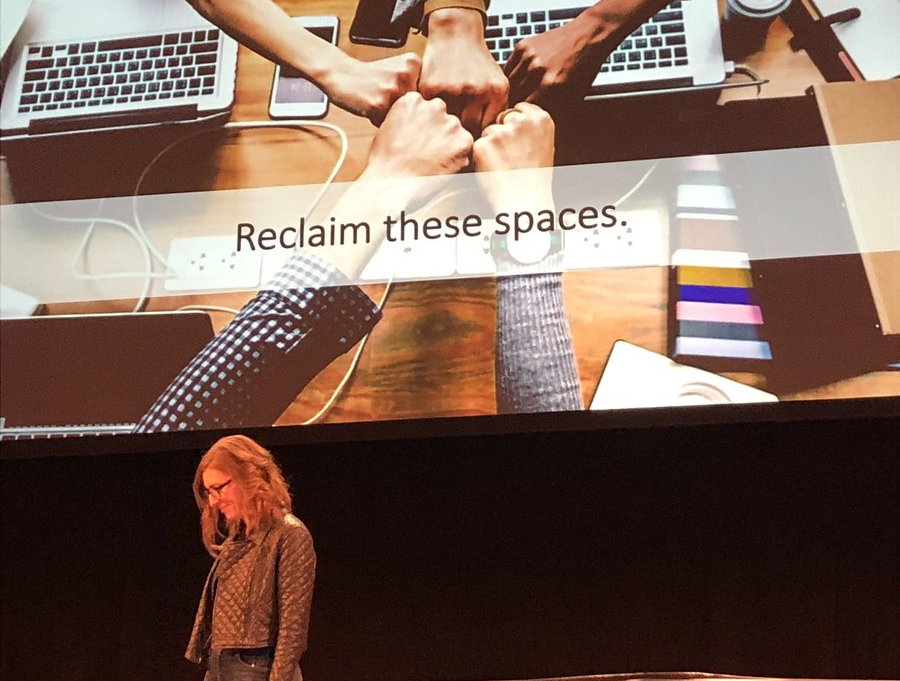How to Become a Better Public Speaker (When You’ve Just Bombed on Stage)

(Pictured above: me during a far less neurotic presentation.)
I am standing in front of a crowd under blinding fluorescent lights. They appear to be listening to my every word.
And I am positively bombing.
The room is too bright, and I can see everyone’s faces, but I am absolutely unable to read their expressions. Are they bored? Disgusted? Concerned? Is it because the content I’m presenting is distressing, or because I’m just bad at this?
I am giving a presentation on online harassment. It’s one I have given before, but this time I am stumbling. I am jet-lagged and exhausted – the night before, I was so nervous that I’d somehow sleep through my start time, I kept waking up in a panic. It now feels like my brain can’t keep up with my slides.
It’s been a while since I’ve last given this talk, and I’ve changed a few things around, and now I can’t remember what I intended to say and where.
I have forgotten my glasses and can’t see the screen behind me, so I don’t know what slide I’m on. I am wearing a shirt that I’ve never wore before (bad idea) and it is stiff cotton. The room is too warm, and sweat has pooled in sticky little ovals underneath each of my armpits. For some reason, I feel the need to mention this fact to the crowd.
I have told them that I am profusely sweating and that I have forgotten my glasses and also that I am terribly jet lagged. It isn’t merely that I am bombing – it is that I can’t stop drawing attention to the fact that I am.
When it is over – an interminable 40 minutes later – people will line up with copies of my book for me to sign. My friend Rachel – one of the few familiar faces in the crowd, will hug me, ignoring my warning that I am a sweaty mess, and tell me how wonderful I was. Ashley, the organizer, is effusive in her support. My friend Laura will send me a text in all caps, screaming at me that I was wonderful (she was unable to make it in person and watched the presentation on the company’s internal livefeed, oh god, there was a livefeed).

Me after the talk. Not visible: my sweat stains and crazy nerves and my forgotten glasses.
One woman will tell me how she’s followed my blog for years, and how wonderful it is to finally meet. Several people will take photos with me. I will make a crack about my armpits. People will laugh.
When it is all over, I am hit with the anxiety of having bombed. But also the realization that based on other people’s reactions, perhaps I wasn’t as terrible as I thought I was.
After dissecting my public speaking experiences for far too long, here’s what I’ve learned about what to do when you think you’ve absolutely tanked on stage:
-
-
- You aren’t as bad as you think you are. Trust me. You just aren’t. I once went completely blank on stage – I could not remember what I was doing or why I was there. The hiccup felt like it lasted a solid minute and a half at least. Later, when I watched the video of it, the silence lasted for (literally) about two seconds. And it simply looked as though I was pausing to collect my thoughts.
– - This is all new for the audience. They have no idea what slides you are messing up, what cues you are missing, what points you’ve forgotten, and how much worse you are doing this time compared to last time. So maybe, you know, don’t point those things out to them.
– - No one will remember the awkward parts but you. If you stumble over a word or get confused as to what to do with your hands, fear not: in two minutes, absolutely everyone will have forgotten. It’s the upside of social media giving everyone the attention span of a goldfish. So just move on – one slip up doesn’t necessarily lead to another.
– - Set a time limit for how long you are allowed to dwell on it. Rand once met an Olympian who had been the favorite to win a gold medal in his sport. And then he messed up during his event and didn’t made the podium. Rand asked him how he dealt with it, and he replied that he gave himself 48 hours. During those two days, he locked himself in a hotel room, and absolutely wallowed in it as much as he wanted to. Then, when it was all over, he put it behind him. He wasn’t going to feel bad about it again. Now, does forgetting what you were going to say warrant 2 days of self-flagellation? Probably not. But if you are one to dwell, set aside a few minutes to feel badly about it. And then move on.
– - Accept that it kind of had to happen. I’m absolutely convinced that you have to spend some time screwing up while on stage. It’s like a sacrifice you have to make to the public speaking gods. No matter how much you practice or how comfortable you are, you will mess up at some point. And then you’ll learn from it, and it’ll happen less and less.
– - It will eventually be a funny story. A lot of my friends do public speaking for their work, and whenever we talk about a particularly mortifying experience, I tell them about how I kept talking about my pit stains on that afternoon in Boston. And everyone laughs. Including me. Hell, it can even be a story you tell on stage one day. Because that sort of vulnerability is a great way of connecting with an audience.
– - Messing up will tell you what parts of your presentation need work. Odds are, there were parts of your presentation that you absolutely nailed – and some that you didn’t. The latter are clearly what needs work – so spend time fixing those spots. Correct that typo. Ruminate on those stats until you can express them in a clean, concise manner.
– - Charge through your mistakes like you know what you’re doing. I’ve watched a lot of people present over the years – professionals, celebrities, authors, amateurs. And the thing that separates the great speakers and the, um, less-than-great ones isn’t whether or not they make mistakes. It’s how they recover from them. The people who do a great job just slide over their errors, the way you would in casual conversation. It doesn’t throw them off, because they don’t let it. They’re just having a breezy chat with a group of several thousand people.
– - Screwing up will make the audience like you more. No, seriously. It’s called the Pratfall Effect, and it’s a known psychological phenomenon. When someone makes a mistake, we feel like they are human and vulnerable and we like them more as a result. So remember: the audience is on your side (unless they’re sociopaths, they are in the audience because they like you), and those little mistakes are just going to endear you to them. (If you want to know more about the Pratfall Effect, I talk about it in a presentation I gave a few years ago at Hubspot’s Inbound conference .)
– - Don’t over-rehearse. If you have your entire presentation memorized, like a script, then it becomes easier to get thrown off. One word out of place and the rest fall like dominoes. Instead, try delivering your points lots of different ways – like a story you’ve told time and again. That way you won’t get tripped up if you can’t remember exactly what you said last time.
- You aren’t as bad as you think you are. Trust me. You just aren’t. I once went completely blank on stage – I could not remember what I was doing or why I was there. The hiccup felt like it lasted a solid minute and a half at least. Later, when I watched the video of it, the silence lasted for (literally) about two seconds. And it simply looked as though I was pausing to collect my thoughts.
-
It’s been a while since that fateful day last year that I felt like I completely screwed up on stage. I’ve winced a couple of times at the memory, and moved on. Just recently, I even pitched the company again about speaking at a conference they’re holding this summer. They said yes.
Oh, and if you want to see samples of me making a fool of myself on stage, you can find some on my About page.








